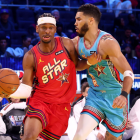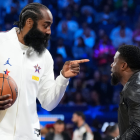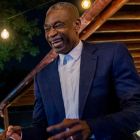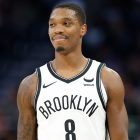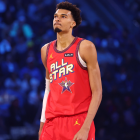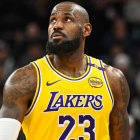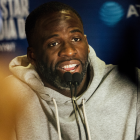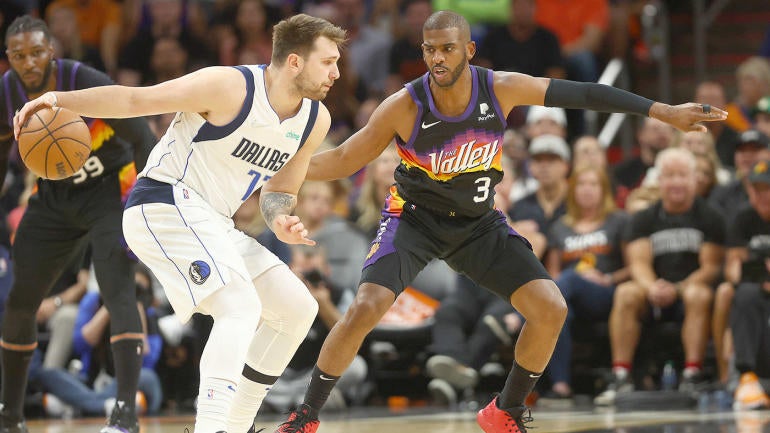
In a way, the Dallas Mavericks' latest loss was something new. During the second half on Wednesday, Chris Paul and the Phoenix Suns pushed a foundational element of modern basketball to an extreme. It was sort of like when Stephen Curry burned down Madison Square Garden from beyond the arc for 54 points, but, instead of hunting 3s, the Suns persistently, ruthlessly hunted Luka Doncic.
Doncic had been picking apart the team that didn't pick him first overall, and then, on virtually every possession, Phoenix was picking on him. Over and over, Paul called for Doncic's man to set a pick, and, over and over, that action created an advantage and the advantage led to a bucket. The Suns put him in 19 ball screens in the second half and scored 1.81 points per chance on those possessions, per ESPN and Second Spectrum.
In another way, the Mavericks' loss was the same old story. Just like Game 1, and just like many of their playoff losses against the Los Angeles Clippers in 2020 and 2021, Dallas had scored enough points to win, but it couldn't get the stops it needed. It was yet another defeat in which Doncic had been extraordinary early and exhausted by the end.
These are precisely the problems that the Mavericks have been trying to solve. With a new front office led by Nico Harrison and a new coaching staff led by Jason Kidd, they signed Reggie Bullock, empowered Jalen Brunson, ditched Kristaps Porzingis, acquired Spencer Dinwiddie and finished the season with the fourth-best record in the West and seventh-best defense in the NBA. Without Doncic at the beginning of the first round, Dallas took a 2-1 lead against the Utah Jazz.
Friday's Game 3 is a moment of truth for the Mavericks, and not just because they are down 2-0. Have the moves they've made put them in a meaningfully different place? Is Phoenix such a juggernaut that Dallas could be both significantly improved and thoroughly overmatched? These are the big, broad questions, but, until tipoff, neither is as pressing as this one: Assuming that the Suns target Doncic again, what can the Mavericks do differently?
Five thoughts:
1. Lessen Luka's load
The reason Phoenix went after Doncic is not that he can't guard anybody; it's because he likely can't do absolutely everything on offense against elite competition for heavy minutes less than two weeks after returning from a calf injury and hold his own defensively. According to the Suns' Jae Crowder, the team discussed the fact that Doncic had played 44 minutes in the opener.
"If he's going to be out there that long, we obviously feel like we gotta make him work even more," Crowder said after Game 2.
Doncic has a league-high 38.8 percent usage rate in the playoffs, up from his regular season mark of 36.8 percent. It was 45 percent in the first half of Game 2. He would have played 40-plus minutes again if it had gone down to the wire.
If the goal is to keep Doncic fresh, Dallas can either play him fewer minutes in the first half or get him off the ball more often. Either way, that means directing some of his playmaking responsibility to Brunson and Dinwiddie. When on the court with Doncic in the playoffs, Brunson has had a 23.2 percent usage rate, Dinwiddie a minuscule 12.5 percent.
Kidd said Wednesday that the Mavericks must get Dinwiddie and Brunson going because "we can't win with just [Doncic] out there scoring 30 a night, not this time of year, and we're playing the best team in the league."
Which brings us to …
2. Pace yourself
Dallas was the slowest team in the NBA after grabbing a defensive rebound this season, per Inpredictable, with an average of 10.9 seconds elapsing before it attempted a shot. It has been even slower (12.1 seconds) in the postseason.
Playing at a snail's pace suits Doncic, and it is counterintuitive to suggest that the Mavericks should speed things up in order to help him conserve energy. It is draining, though, to take on a set defense every time down, especially if Mikal Bridges is draped all over you.
Yes, running is tiring. But it doesn't have to be Doncic's foot on the gas. For a model, Dallas can look to its opponent -- Phoenix was similarly reliant on its halfcourt offense last season, but, en route to the Finals, it encouraged Paul to throw hit-ahead passes to free himself from full-court pressure, and he hasn't stopped doing it. Given that Kidd's coaching staff wants Brunson and Dinwiddie to find their rhythm, it might as well try to find them opportunities to attack the Suns while they're still on their heels.
3. Rotation, rotation, rotation
Let's say Kidd removes Dwight Powell from the starting lineup, in order to give the Mavs more spacing and avoid a third straight early deficit. Should he insert Maxi Kleber or do something more radical?
The Mavs made a run late in Game 1 without a traditional big man on the court, but didn't go to this smallball look again until there were eight minutes left in the fourth quarter on Wednesday. Would Kidd dare put Dinwiddie in the starting five and start Dorian Finney-Smith at "center," matched up with Deandre Ayton?
Kleber is the safer bet, but there are arguments for getting weird, particularly if Dallas gets desperate. If you can't win the conventional way, you have to try to junk things up, and having three playmakers on the court makes it easier to avoid attacking Bridges. The Mavs will not be able to duplicate what they did to the Jazz's poor perimeter defenders, but they can try to approximate it. The one clear advantage they have is 3-point volume, and going small accentuates it.
4. Some scheme stuff
Kidd said that Dallas knew the Suns would bring Doncic into ball screens, and it needs to "do a better job of helping him." Part of that is likely pre-switching, a strategy that it used sparingly in Game 2. On the last play of the video embedded above, when Doncic's man, Cameron Johnson, goes up to screen for Booker, Doncic and Powell switch off the ball, keeping Doncic out of the action. Sure, Doncic ends up in another action moments later, but it is at least an example of the Mavericks trying to protect him.
Another example: Halfway through the fourth quarter, when Johnson screens for Paul, Doncic simply doesn't move -- he is effectively pre-switching with Brunson, but the communication isn't there and Brunson only realizes where he's supposed to be as the screen is being set:
The Mavs were not punished that time, but, if they're going to do this, they need to tighten it up.
Dallas could go to a zone, but it did not do much of that in the regular season and this is a risky strategy against Phoenix, a smart team that cuts, passes and shoots as well as anybody. There is likely no scheme that the Suns can't counter -- Paul and Booker exploit switches, destroy drop coverage and welcome blitzes. The best "adjustment" the Mavs can make is to execute better, which is why it's important that Doncic still has some energy in the fourth quarter.
5. Pick on Paul
Since Paul is the one who did most of the Doncic-hunting, the Mavericks could give him a taste of his own medicine. They likely won't be as relentless as the Suns were, but they could certainly put Paul in more actions defensively, in an effort to tire him out before his customary fourth-quarter takeover.
Paul is a master of controlling the game offensively. He will feel out the opposing team, get teammates going and call his own number exactly when Phoenix needs it. He cannot, however, control how much energy he must exert on the other end. For his 37th birthday on Friday, Dallas could give him a steady stream of Doncic post-ups.
![[object Object] Logo](https://sportshub.cbsistatic.com/i/2020/04/22/e9ceb731-8b3f-4c60-98fe-090ab66a2997/screen-shot-2020-04-22-at-11-04-56-am.png)










